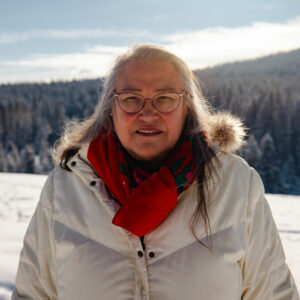Lea Bill
Indspire > Events > Indspire Awards > Laureates > Lea Bill
Lea Bill
Health (2024)
Pelican Lake First Nation, SK
Lea Bill knows that authentic health and healing can come from many different sources. Growing up traditionally, speaking only Cree until she was 14 years old, Lea received her first healthcare lessons from her grandmother. She has worked for over 30 years as an Indigenous Knowledge Holder, researcher, and community health nurse, blending Indigenous ways of knowing with her training as a registered nurse in the Western system.
Lea’s knowledge has been consistently sought by Indigenous and Western organizations alike; she worked in government health structures in the, the Northwest Territories, and Alberta and in advisory capacities in Saskatchewan and in international forums. She served on the board of directors of the Aboriginal Nurses’ Association of Canada (now the Canadian Indigenous Nurses’ Association – CINA) and then as its President for three terms. She is also Executive Director of the Alberta First Nations Indigenous Governance Centre (AFNIGC).
A pipe carrier, Lea has often provided significant advice on the subject of ‘research as ceremony’ in such key venues as the Canadian partnership Against Cancer’s Indigenous Cancer Strategy work. She has participated as Co-Lead in several significant First Nations research initiatives regarding cancer and cancer prevention and anti-Indigenous racism in the emergency department.
Lea’s voice is heard on the national stage and around the world. On Indigenous Nurses Day during national Nursing Week celebrations, she and CINA were recognized in Standing Orders for the House of Commons. She is the First Nation advisor for the First Nations, Inuit, and Métis at the Canadian Partnership Against Cancer, and represented Canada as a co-convenor at the 2nd World Indigenous Cancer Conference in Calgary 2019 and more recently at the WICC in Australia in March 2024.
Lea continues to provide guidance through her work as an indigenous researcher guides innovative approaches of traditional Indigenous ways to complement western research supporting the inclusion of Indigenous ways to knowing in any professional category. Whether she is teaching, caring for patients, speaking to youth or to international experts, Lea is an unfailing advocate for Indigenous well-being.







